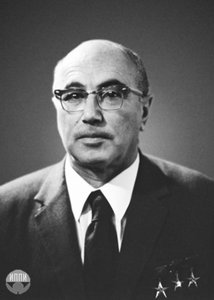Background
He was born Jewish in March 1914in Minsk. Four months later his family moved to Saint Petersburg.


He was born Jewish in March 1914in Minsk. Four months later his family moved to Saint Petersburg.
In 1936 he defended his dissertation, which was on the adsorption and catalysis on heterogeneous surfaces, for his Candidate of Science (equal to PhD).
In 1939 he received the degree of Doctor of Science (Physics and Mathematics).
In May 1931, at age seventeen, Zel'dovich became a laboratory assistant at the Institute of Chemical Physics of the USSR Academy of Sciences. He was associated with the Institute until the end of his life. Between 1937 and 1948 he worked on the theory of ignition, combustion and detonation. In 1939–1940 together with Julii Khariton Zel'dovich achieved important results in the Theory of Nuclear Chain Reactions. In 1943 he began his participation in the Soviet Atomic Project, working along with Igor Kurchatov. His work on nuclear weapons continued until October 1963. In 1952 he began work in the field of elementary particles and their transformations. In early 1960s he started working in astrophysics and physical cosmology. Zel'dovich worked on the theory of the evolution of the hot universe, the properties of the microwave background radiation, the large-scale structure of the universe, and the theory of black holes. Zel'dovich played a key role in developing the theory of black hole evaporation.
Zel'dovich discovered the mechanism, known in physical chemistry as Thermal NO Mechanism or Zel'dovich Mechanism.
He predicted, with Rashid Sunyaev, that the cosmic microwave background should undergo inverse Compton scattering. This is called the Sunyaev-Zel'dovich effect, and measuring it is, at present, one of the biggest observational efforts in cosmology.
